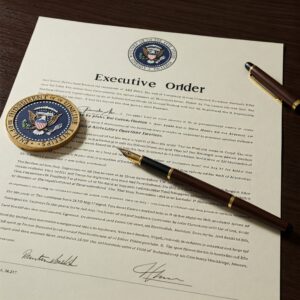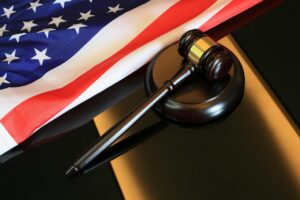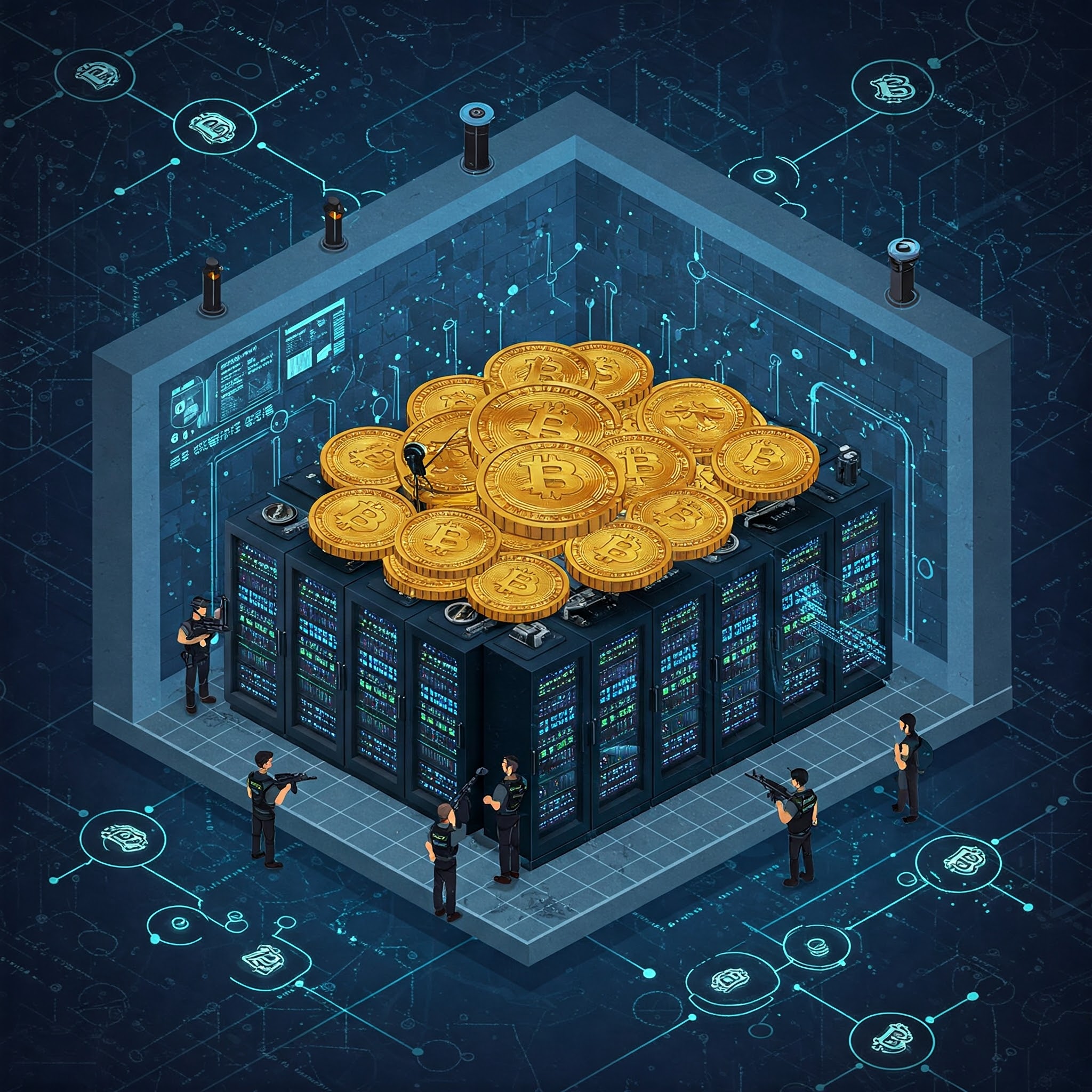In my previous article, I talked about the future of cryptocurrency, especially now that we’ve got a new President and administration in office here in the United States. I talked about things such as how President Trump is the first pro-crypto President in history, what his potential plans are for cryptocurrency, how the SEC’s reign of terror is finally coming to an end with the resignation of Gary Gensler and what we can possibly expect for cryptocurrency during the next four years. Well there has already been a lot of developments in the first week of office for President Trump which also includes cryptocurrency and one of those things involves a US Bitcoin Reserve and we’ll be taking a closer look at that here.
Kicking off the buzzworthy conversation, folks started murmuring about a US Bitcoin Reserve back in the early 2010s. It was the time when Bitcoin was riding high, and everyone was curious about how governments might harness its power. The idea then was mostly theoretical, kind of like discussing the moon’s cheese content, but with more financial implications.
Around that time, Bitcoin was becoming a hot topic due to its rapid increase in value and adoption. Enthusiasts and crypto experts pitched the idea that a Bitcoin reserve could potentially stabilize economies by integrating the digital currency into national reserves. It was a bold notion, but not quite on the radar of conventional economists and politicians who were still trying to wrap their heads around what Bitcoin even was.
People often ask why would the government even consider a Bitcoin reserve? Well, looking at countries like El Salvador, which took the plunge to make Bitcoin legal tender, paints a picture of future possibilities. Their move sparked conversations about financial independence and innovation in monetary policies that could lead to a similar path for other nations.
Back home, the conversations around a Bitcoin reserve are also driven by the US’s play in the global financial chess game. Some see it as a step to counteract the dominance of traditional currencies like the Yuan or the Euro. As countries explore digital currency frameworks, a US Bitcoin Reserve becomes less of a sci-fi plot and more of a strategic consideration.
Ever since Donald Trump ran for President for a second term, he has repeatedly called for a US Bitcoin Reserve which might also help reduce the massive debt that the US has. Now that he is officially President and taken office, it is looking more and more like that will become a reality especially with the executive order that he signed just this past week. We’re going to take a closer a look at that Executive Order and see if it entails creating of a Bitcoin reserve.
Impact of the Executive Order on AI and Crypto on Bitcoin Reserves
The Executive Order on AI and crypto got everyone talking, but does it actually set the stage for a Bitcoin reserve? Here’s a closer look at what the order covers. It’s a sweeping mandate touching on broader crypto frameworks aimed at fostering innovation while ensuring security. However, it doesn’t directly state, ‘Hey, we’re creating a Bitcoin reserve.’ It’s more about setting up a regulatory foundation that could support future crypto ventures.

So, what’s the deal with this whole order? The real focus is on a broader landscape of digital currencies and technologies, pushing forward a game plan that includes AI tech while considering the potential roles of cryptocurrencies in our economy. It’s a sign that the government acknowledges the growing influence of these technologies and is seeking ways to harness them effectively.
The implications of this Executive Order could open doors for Bitcoin and other cryptos. If these digital currencies start playing a bigger role in economic strategies, a Bitcoin reserve might just find its way onto the agenda. The order is about laying down the groundwork for a potentially booming digital market, hinting towards a future where crypto could be integral to national policies.
Catch the drift? Although the order doesn’t outright create a Bitcoin reserve, it sets the wheels in motion for a regulated environment that can eventually support such an initiative. It’s all about building a sturdy framework now to accommodate innovative financial structures later. One thing that was mentioned about the Executive Order was looking into creating a reserve of digital assets or cryptocurrencies. This has created excitement in the crypto community as there is now the possibility of a reserve of other major cryptocurrencies besides just Bitcoin. While this news did generate excitement, not everyone was happy about this and I will talk more about that towards the end.
Examining the Possibilities of a Broader Crypto Reserve
When talk centers on a crypto reserve, it throws a wider net than just Bitcoin—think all kinds of digital currencies getting their moment to shine. Creating a crypto reserve instead of focusing solely on Bitcoin might be the smarter move for a diversified financial strategy.
So, why consider a whole crypto bunch? It’s like diversifying your investment portfolio. In financial terms, betting on a range of cryptos could spread risk and tap into different technological benefits each one offers. Bitcoin may be the headliner, but others bring unique strengths to the table, too.

Crafting a broader digital reserve makes for interesting economic chess moves. It could position the US as a front-runner in digital currency adoption and innovation, potentially enhancing economic robustness and international prestige. It’s a way to adapt to an ever-more digital world where money-sometimes exist only as ones and zeros.
Now, onto the challenges. Balancing all those currencies and their volatility might seem like juggling flaming torches. It demands watchful management and a clear understanding of what each currency adds to the crypto pie. Also, the tech-y underpinnings, like blockchain networks supporting these currencies, need constant attention to stay secure and efficient.
Going this route could mean unforeseen benefits, like improved cross-border digital transactions and innovative financial products. It’s all about thinking ahead, evaluating both the perks and the potential stumbling blocks that come with a mix of cryptos rather than just banking on Bitcoin.
Regulation Before Adoption: The Legal Prerequisites for Establishing a Bitcoin Reserve
So, about the legal stuff—before dreaming too big about a Bitcoin reserve, we gotta face reality: regulations. The crypto space is like the wild west, and everyone agrees it needs a bit more taming to fit into the national economy.
Currently, US crypto regulation is in its awkward teenage phase. Sure, some rules exist to control digital assets, but things are constantly changing. A clear and comprehensive legal framework is super important if the idea of a national Bitcoin reserve is to get off the ground.

Without proper regulations, the whole concept risks becoming a financial maverick. Stable legal structures can offer protection to the market and build public trust, essential for any reserve to be taken seriously—both nationally and globally.
And don’t think regulations are just out to spoil the party. Sensible frameworks can encourage innovation while ensuring that crypto reserves aren’t just castles built on sand. With the right balance, regulation can actually be the foundation stone to success.
Finding this balance isn’t gonna be a walk in the park, though. It involves policy-makers, tech experts, and financial gurus all speaking the same language. That way, they can create rules that promote growth while keeping dodgy practices in check.
In sum, a Bitcoin reserve isn’t just about holding onto a bunch of digital coins. It’s about building a trustworthy system where policies and innovations walk hand in hand. The result? A smarter, more resilient economic tool.
The Role of the SEC and Other Regulatory Bodies in Bitcoin Reserve Establishment
Alright, time to tackle the alphabet soup of regulators, kicking off with the SEC. Everyone wonders if they’re standin’ in the way of a potential Bitcoin reserve. The Securities and Exchange Commission has a pretty big say in how this unfolds, especially since their job is to keep financial markets fair and orderly.
The SEC’s current stance? They’re cautious, treating most cryptocurrencies with a wary eye, considering them securities in many cases—each crypto transaction, therefore, needing to comply with loads of regulations. Some folks might see this as a speed bump, but a good look reveals that it pushes for transparent, well-governed financial dealings, which is actually important for establishing any kind of national reserve.

Will they budge? The word around is that for a Bitcoin reserve to gain traction, new or revised legislation might be required. Congress and other bodies would have to step in to set up a framework that both protects investors and encourages innovative financial systems.
And let’s not forget other players like the Commodity Futures Trading Commission (CFTC) and the Financial Crimes Enforcement Network (FinCEN) who have their part to play. They all need to be on the same page to make sure that any reserve established isn’t just robust but also well-monitored and secure.
Ultimately, a US Bitcoin Reserve would need a regulatory green light, and getting there involves a tango between regulators, crypto enthusiasts, and policymakers. Once aligned, the path to integrating Bitcoin into something as formal as a national reserve could be cleared, kicking open the door to new economic horizons.
A Civil War Brewing in The Crypto Community?
Now it’s time to talk about what I hinted at it earlier which is that not everyone seems to be excitied about a general cryptocurrency reserve. Bitcoin enthusiants are now up in arms at the mention of a digital assets reserve rather than just a Bitcoin only reserve. The Bitcoin community has now targetd the XRP community in its anger calling the company of Ripple a sham and only catering to corporate interests in America.
In my opinion, this is completely pointless and not needed at this time especially since the war of the SEC against cryptocurrency is coming to an end. We need to be more united than ever to get the cryptocurrency market to flourish like never before in the US and infighting between different crypto communities does not help to bring this about. Bitcoin is the first cryptocurrency ever created and isn’t going anywhere, however, it is generally known as being a crypto of a store of value or investment rather than a utility token.

XRP’s reason for existence is utility as it’s meant to be a bridge for near instant cross border payments anywhere in the world. It’s ledger can also be used for real world tokenization and it is being heavily looked at right now just for that purpose when things are ready for other assets around the world to be tokenized. The CEO of Ripple himself said that he is not against Bitcoin and sees the value in it especially considering how well it is doing right now and is holding above $100,000. There’s no reason to be against XRP and having a reserve of other digital currencies does make a lot of since. I think the US Government, if they decide to create a cryptcurrency reserve, should do Bitcoin first and the add others to the stockpile. I believe the Department of Justice already holds 200,000 Bitcoin tokens so that would be a wonderful start right there alone.
Big things are already happening in the crypto world especially with the crypto Executive Order already being issued. The SEC also quietly rescended a policy prohibiting banks and other financial institutions from holding digital assets. It has also been mentioned that Wall Street CEOs are now fully ready to get heavily involved in cryptocurrencies. Right now, the crypto market as a whole is worth just over $3.6 trillion dollars and if Wall Street and other large financial firms get into it, it’s going to skyrocket well into the tens of trillions of dollars. More and more crypto ETF applications are being sent out to the SEC as well by major financial and investment firms. Folks, we are on the cusp of a MAJOR crypto explosion like never before. While I’m not a financial advisor, in my opinion, now is one of the best times to get into cryptocurrency while a lot of them are still low in prices because once crypto regulation comes in that favors innovation in the crypto world, especially the technology behind it which is blockchain.

